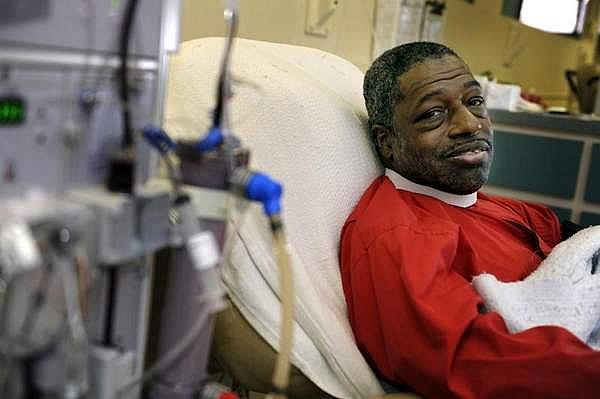Blacks face tougher time finding kidney for transplant
Second Day Story: Dialysis is lifeline for many as kidney failure in Tennessee has doubled in the last two decades.
Tom Wilemon wrote the series, Diabetes Hot Zone, for The Tennesean with support from the 2012 National Health Journalism Fellowship a program of USC’s Annenberg School of Journalism. Other stories in this series include:
In pockets of Nashville, diabetes runs rampant
With dramatic weight loss, Nashville diabetes counselor sets example

James Ridley was on dialysis for 10 years before he died last summer.
As an African-American, he was at high risk for kidney failure and had slim chances for a transplant. But he kept his spirits up, scrubbing his Ford Explorer as if he was washing away the worries of the world, doting on his nephew Deonta and sharing smiles at the Dialysis Clinic Inc. facility in Madison.
“He always had you laughing,” said Robert Edwards, another patient at the dialysis clinic.
Humor helps when you wait too long for a kidney or know you will never get one. Faith matters. And discipline makes a difference in how long you live.
Those are the survival tips from long-term dialysis patients in the diabetes hot zone, the predominantly African-American ZIP codes of East Nashville and North Nashville where the disease is most prevalent. Already prone to the kidney-destroying illnesses of diabetes and high blood pressure, blacks have another health disparity: They are less likely to be a match when a kidney becomes available. If more African-Americans signed up to be organ donors, their chances would improve.
Edwards and wife Vanessa are both on dialysis. They were first diagnosed with diabetes and then high blood pressure. He says prayer helped them stop craving sugar and change their diets, but blood pressure proved to be a bigger challenge.
“She was under a lot of stress because of my health issues,” he said. “That led to high blood pressure for her.”
He went into kidney failure, then she did. They started dialysis in their 40s. He has been on a waiting list for a kidney for five years.
Difficult to match
Although organ transplants can occur between races, matches are more difficult to achieve for blacks. Transplant recipients must have similar genes in their immune systems to those of the donor. Otherwise, the body will reject the organ.
“The genetic makeup is so broad-based in African-Americans,” said Dr. Marquetta Faulkner, chief of nephrology at Meharry Medical College. “African-Americans have a big mix of Caucasian, African — it just depends on your genetic makeup.”
Whites account for 68 percent of all organ donors, while African-Americans account for only 14 percent, according to the U.S. Organ Procurement and Transplantation Network. Although the number of blacks and whites waiting for a kidney in 2011 was about the same, whites received just over half of kidney transplants that year, while blacks received less than a third.
Yvonne Kennedy decided against trying to get on the waiting list. She has been on dialysis for more than nine years.
“I may have gave it a thought, but that’s all it was, a thought,” she said.
Undergoing dialysis is like holding a part-time job. It requires three trips to a clinic each week for treatments that last three to four hours as a machine draws blood, cleanses it of wastes and then pumps it back into the body.
The same patients go for treatments at the same times.
“We sit around and we talk,” Kennedy said. “We talk about religion. We talk about the news. We talk about food. They tell me about their children and their families. We talk about my family as well. We’re just like one big happy family.”
Jokes are always welcome.
“If you don’t laugh with it, you wind up crying and being very depressed,” she said.
The banter trails off as people start watching their favorite TV shows or simply fall asleep.
Kidney failures soar
Diabetes is the leading cause of kidney failure nationally, but in this region, the main culprit is high blood pressure. Diabetes overworks people’s kidneys until they wear out, while high blood pressure damages the small vessels in the kidneys.
New cases of kidney failure have more than doubled in Tennessee, rising from 1,078 in 1990 to 2,574 by 2009, according to federal figures.
Although skinny people can have high blood pressure and diabetes, being overweight increases the odds. People can reduce risk by exercising, watching their diet and cutting back on salt. Early treatment can prevent kidney damage.
“I literally went into dialysis kicking and screaming, but once I started doing it, it wasn’t a bad experience,” Edwards said. “The only thing that really concerned me was that I saw a lot of people die.”
People can live for decades on dialysis, but that requires following a strict diet, limiting fluid intake, not missing treatment sessions and not succumbing to a complication from end-stage renal disease.
This story originally ran in The Tennessean and USA Today on January 21, 2013.
Photo Credit: George Walker IV
